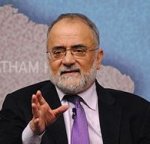The Taliban’s Nonindigenous Ideology

Ahmed Rashid
Michael Hughes
October 2, 2021
When the Taliban first seized power in the 1990s they introduced a twisted Deobandi Sunni-based ideology, with a twist of Wahhabism, completely alien to Afghanistan and anathema to the country’s tradition and culture. As they now re-impose this barbaric creed some commentators are suggesting the doctrine is mixed with elements derived from the native Pashtun tribal code – which is a distortive narrative that needs to be shunned.
More than two decades ago, journalist Ahmed Rashid, who closely observed the radical movement during Mullah Omar’s reign, adeptly captured the essence of the true Afghan-style Islam which stood in stark contrast to the Taliban’s intolerant reactionary brand – especially its brutal sanctions for alleged doctrinal transgressions.
“No Afghan can insist that the fellow Muslim standing next to him also prays,” Rashid writes in Taliban: Militant Islam, Oil and Fundamentalism in Central Asia. “Traditionally Islam in Afghanistan has been immensely tolerant – to other Muslim sects, other religions and modern lifestyles. Afghan mullahs were never known to push Islam down people’s throats and sectarianism was not a political issue until recently.”
In fact, until 1992, Rashid observes, Sikhs and Jews even played a significant role in the Afghan economy.
Here we sit 21 years later and the very same Mr. Rashid is ready to quash any notion that the latest incarnation of the Taliban are in any sense a new and improved variety.
“The crucial question that everyone has been asking me is, you know, have the Taliban changed? And quite frankly I’ve been saying for a long time – no, they haven’t. They have a very oppressive ideology and that has not changed at all,” Rashid said during a livestream with the Carnegie Endowment of International Peace on September 29.
Rashid expressed doubts that a group like the Taliban “will drop their ideology and become liberals.”
Just about every day since the Taliban re-captured Kabul in August, events have reflected Rashid’s concerns. They have evicted hundreds of minority Shiite Hazara families, banned women from Kabul University, and publicly strung up alleged criminals from cranes in a brutal public display of Taliban justice.
Mullah Nooruddin Turabi, chief Sharia law enforcer, has vowed that the Taliban will continue to carry out executions and other brutal punishments as they did in the 1990s.
RFERL reporter Frud Bezhan posted a document from the Taliban’s Ministry of Rural Development ordering only men to return to work as they prepare a “mechanism” for how women can work. This comes shortly after the Kabul city government sent all women home except some to keep the women’s bathrooms clean.
Several analysts have rightly traced the roots of this medieval school of thought to a Dark Age interpretation of Deobandi Islam, a very conservative doctrine which originally stems from India where it was, however, practiced rather peacefully for more than 150 years. The strain is also Wahhabi-infused due to the influence of the Saudis on the mujahideen, the Taliban’s ancestors.
However, they have wrongly asserted that it was also inspired by the tribal code of honor known as Pashtunwali. For starters, Pashtunwali is a community-based cultural code that emphasizes fierce independence and individual rights – quite contrary to the Taliban practices such as, as Rashid pointed out, telling fellow Afghans how they should pray.
It is also associated with vertical organizational structures and local decision-making and consensus building as opposed to a hierarchical Caliphate where edicts are imposed on the masses from on high.
If anything, the Taliban seek to de-Pashtunize Afghanistan – subjugate ethnicity and tribal values to one universal identity – that of Islam.
In traditional Afghan society the khan was the true leader, not the mullah. The mullahs certainly took on a larger role when a jihad was declared but would soon revert to their proper place. However, the Taliban movement is a constant jihad.
As anthropologist Thomas Barfield has pointed out, the Taliban was unlike any other Afghan political movements not only because of their refugee roots but their “exclusively clerical origin.”
The movement’s refugee roots are a crucial aspect – here were Afghans who spent their entire lives outside of Afghanistan, so they could hardly tell that their doctrine was “extremist” because, for them, it was the norm. The refugee flows into Pakistan as a result of the Soviet jihad ended up creating what Barfield called a “new class of people.”
And so generations of Afghan students (Talibs) trained in Pakistani madrassas were taught that their ultimate goal was to return to their true homeland and implement a purer version of Islam.
The Afghans, some could argue, are apparently willing to live under this brutal ideology just as they did in the 1990s in the name of stability. But Rashid pointed out that the Taliban began seeing resistance from the population because of their misrule and mishandling of a famine that completely demoralized the population.
“And I envision something like that happening again because the Taliban are not going to be able to produce policies that feed the people,” Rashid concluded.
